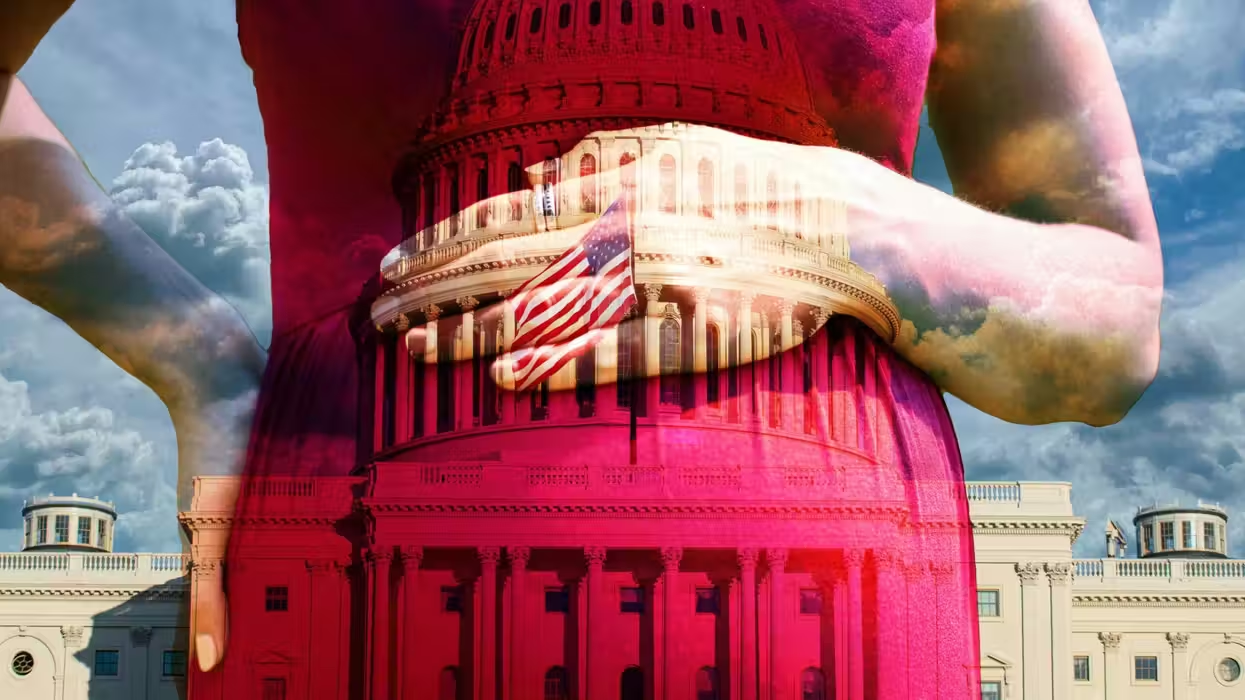
© 2025 Blaze Media LLC. All rights reserved.
Religious Bigotry': These Are the Differences Between the Medias' Treatment of JFK's Catholicism & Romney's Mormonism
July 31, 2012
Editor's Note: This is an exclusive report that was produced by the Media Research Center's Culture and Media Institute. The research and subsequent article was conducted and written by Paul Wilson.
During the 1960 presidential campaign, Democratic presidential candidate John F. Kennedy was attacked for his Catholic faith, then viewed by many as subversive and un-American. Anti-Mormon bigots are now targeting Republican presidential candidate Mitt Romney for his Mormon beliefs, which are now viewed by many “progressives” as a “transparent and recent fraud.” But in those 50 years, the role of the media has changed significantly.
A June 2012 study performed by American National Election Studies (ANES) found that 43 percent of liberals would be “less likely” to vote for a Mormon candidate for religious reasons. An essential point, given how often news outlets highlight Romney’s religion.

In 1960, major media outlets refused to tolerate religious bigotry, characterizing it as “bilge” and calling its practitioners “small-minded and prejudiced persons … not representative of America.” In 2012, supposedly “mainstream” outlets have given opponents of Mormonism a platform to call the church the “Salt Lake City empire of corporate greed,” obsessively labeled Mitt Romney as Mormon, and even engaged in anti-Mormon bigotry themselves. These anti-Mormon voices have been amplified by the liberal echo chamber.
The difference is more than 50 years – the difference is politics. In 1960, media outlets defended Kennedy, who was part of a faith whose members traditionally voted Democratic. In 2012, those same media outlets are attacking Romney, who belongs to a faith whose members typically support conservative causes and vote Republican.
Media Defended JFK’s Catholicism Then…
In an April 21, 1960, speech to the American Society of Newspaper Editors, then Sen. John F. Kennedy spoke about the role of the press in fanning the flames of religious prejudice, declaring: “And the press, while not creating the issue, will largely determine whether or not it does become dominant – whether it is kept in perspective – whether it is considered objectively – whether needless fears and suspicions are stilled instead of aroused.” The nation’s top news outlets heard John F. Kennedy’s plea, and sought to quell suspicions about Kennedy’s Catholic religion. Even before Kennedy’s iconic Sept. 12, 1960, speech to Protestant ministers concerning his Catholic faith, major media outlets defended Kennedy against demagogues who attacked his religion.
The New York Times blasted religious bigotry in a Sept. 4, 1960, editorial titled “As the Campaign Opens,” stating: “There will always be in any election and between elections small-minded and prejudiced persons who have a neurotic compulsion to feel superior to somebody or an urge to blame some racial or minority group for their own individual failures or misfortunes. But these people are not representative of America. They have rarely determined elections in the past and they will not determine the one that is coming. Millions of Catholics, Protestants, Jews, and people of no formal faith will testify that prejudice cannot be endorsed in this country without doing political damage to the persons or candidates who endorse it.”

The Washington Post was equally intolerant of religious prejudice. In a Sept. 2, 1960, editorial titled “Debasement of Politics,” the Post called religious attacks “bilge.” The paper declared: “It is hard to gauge the influence of this kind of material in a political campaign. Probably it evokes a response only in those who want to believe it – that is, in those whose prejudices make them hospitable to such appeals. It is doubtful that this kind of appeal can be countered on any rational basis. But there can be no doubt whatsoever that it debases the political process and does irreparable damage to the fabric of social unity.”
In a Sept. 9, 1960, editorial titled “Negative Thinking,” the Post observed a group promoting religious bigotry: “It professes to be in favor of the separation of church and state; but it is doing its utmost to inject the consideration of religion into the politics of the Nation. It professes to be in favor of religious freedom; but it argues that if a man belongs to a particular Church he is not free to become President of the United States.
Nor was disapproval of religious bigotry confined to print outlets in 1960. NBC contributors also decried religious bigotry. On the April 24, 1960, telecast of the NBC program “Meet the Press,” reporter John Steele asked the Democratic presidential candidate from 1956, Adlai Stevenson: “Governor, there is one other issue, a dark and ominous one, which seems to hang over the whole business of selecting a president this year. It is the issue of religion. Has this really got any place in the business of politics?” On Nov. 6, 1960, Nixon’s campaign manager, Leonard Hall, was asked on “Meet the Press” to condemn anti-Catholic literature circulated by groups unaffiliated with the Republican campaign.
Below, watch TheBlaze's editor-in-chief Scott Baker, faith editor Billy Hallowell and Matt Philbin, managing editor of the Media Research Center's Culture and Media Institute, discuss these issues:
…Anti-Mormon Bigots Now
Fifty years later, the major news media have aided and abetted religious attacks on the faith of the presumptive Republican presidential candidate, and have even joined in making those attacks.
In a June 18, 2011, editorial ostensibly decrying prejudice against Mormons, The Washington Post expressed disdain for the Mormon church, complaining: “There’s plenty about Mormonism that might strike a non-believer as strange or objectionable. Is it literally true that an angel helped Joseph Smith find a sacred book made of golden plates in rural New York almost 200 years ago? It is not to the church’s credit that it fought same-sex marriage in California or that it banned African Americans from its clergy until 1978.”

Long past Mormon history was of particular interest to the Post. The paper’s Sandha Somashekhar went back 150 years to tell the story of a massacre committed by Mormons – in 1857. On Feb. 28, 2012, the Post’s Jason Horowitz raised the specter of Mormon racial history. On Feb. 16, 2012, Horowitz profiled “excommunicated Mormon” Helen Radkey and her quest to “expose” Mitt Romney’s Mormon ancestors and their posthumous polygamist marriages.
The New York Times also encouraged anti-Mormon bigotry. Times columnist Maureen Dowd’s March 17, 2012, op-ed, headlined “Is Elvis A Mormon?” criticized Mitt Romney for not personally condemning the practice of baptism of the dead. Dowd also attacked Romney’s Mormonism in an Oct. 18, 2011, op-ed titled “Anne Frank, A Mormon?,” citing vulgar liberal comedian and Obama funder Bill Maher: “Bill Maher bounded into territory that the news media have been gingerly tiptoeing around. Magic underwear. Baptizing dead people. Celestial marriages. Private planets. Racism. Polygamy.”
Dowd was not alone at the Times in spreading anti-Mormonism. Columnist Charles Blow tweeted to Mitt Romney “stick that in your magic underwear!” (He was forced to apologize for his comments.) In a Nov. 12, 2011, article in the Times Sunday Review, Professor Harold Bloom attacked the “Salt Lake City empire of corporate greed.”
Nor has religious bigotry been confined to print. MSNBC, the left-wing sister network of NBC News, has attacked Mormons on numerous occasions. MSNBC “The Last Word” host Lawrence O’Donnell mocked Mormonism on April 3, 2012, as being “created by a guy in upstate New York in 1830 when he got caught having sex with the maid and explained to his wife that God told him to do it.” (O’Donnell was forced to apologize for his comments.)

MSNBC “Hardball” host Chris Matthews portrayed Catholics and Mormons as “cultists” on March 13, 2012, and declared: “They are willing to outsource [defeating the President] to a Mormon ... It's almost like calling up India or somewhere in the third world to get your computer fixed. You don't care who's fixing it, just fix the damn computer.”
On Feb. 28, 2012, MSNBC contributor and Salon.com editor Joan Walsh mocked Mitt Romney’s faith over Twitter. (Walsh initially tried to defend her comments, but later apologized.) On April 19, 2012, MSNBC anchor Martin Bashir snidely cited the Book of Mormon to declare Mitt Romney as a liar in danger of damnation: “Given what the Book of Mormon is clearly saying, Mr. Romney has but two choices. He can either keep lying and potentially win the White House, but bring eternal damnation on himself, or he can start telling the truth.”
It is telling that major media outlets have promoted anti-religious prejudice against Mormons, while their journalistic predecessors refused to tolerate such “bilge.”
The Echo Chamber Howls
Anti-Mormon attacks aren’t confined to major news outlets; they’ve become commonplace in the liberal online world. So-called “progressive” media outlets have taken up the “magic underwear” banner. Left-wing media outlets have taken their cue from the mainstream media, launching vicious attacks on Mormons.
Politico’s Dylan Byers, in his May 18 column “When will we talk about Mormonism?,” demanded more media scrutiny of Mormonism, calling for a “national conversation about the Mormon faith, including its past practice of polygamy (which was renounced by the church in the 19th century) and its exclusion of African-Americans from the priesthood (until 1978).” Among liberals, this “conversation” has consisted of attacks on and misrepresentations of Mormon doctrine.

Attacks on Mormonism attempt to paint Mormons as backward. In an April 16 piece, BuzzFeed’s McKay Coppins (ironically, himself a self-identified Mormon) used Mormon teachings on gender as a club to bash Mormons for not being progressive, declaring: “These doctrinally-defined gender roles aren't entirely unique — they've been preached by various sects for centuries — but Mormons have proven uniquely unwilling to bend them to fit modern times.” On April 10, Coppins had previously argued on MSNBC’s “Andrea Mitchell Reports:” “There are also verses in Mormon scripture that teach that dark skin is a curse from an angry god and Mormon leaders used to teach that black people were less valiant or less righteous in a pre-mortal life.”
Other liberal outlets simply mocked Mormonism, or defended the right of liberals to do so. On April 3, Time Magazine political columnist Joe Klein declared that Mitt Romney’s faith “leads him to be mistrustful of the outside world,” and bashed the candidate for baptism of the dead and “the underwear.” On April 9, Salon’s Alex Parenne fretted: “everyone who has ever made a 'magic underwear' joke will be declared an intolerant liberal bigot.”
News Media’s Faith Double Standard
When Sen. John F. Kennedy ran for president in 1960, the major news outlets urged voters to see him not for his faith, but for who he was. It was a major moment for journalism. Had news outlets embraced bigotry against Kennedy, perhaps he would never have even won election.
But in 2012, that history is lost on many in the news media. While the outlets might still be pretending they have a similar mindset, they do not. Journalists have repeatedly underlined Mitt Romney’s Mormon faith – far more than they have for candidates of other religions – as a shorthand way to set him apart. And news outlets have done far worse, serving as mouthpieces for anti-Mormon hate and embracing it themselves.
Anti-Mormon bigotry is even more inexcusable coming from journalists who claim to revere the memory of John F. Kennedy. MSNBC’s Chris Matthews wrote a book extolling the virtues of the Catholic John F. Kennedy, yet emulated anti-Kennedy bigots by labeling Romney a “cultist.”
The hypocrisy is puzzling, or would be if it weren’t obvious that journalists will only defend the faith of a liberal Democrat running for president.
Want to leave a tip?
We answer to you. Help keep our content free of advertisers and big tech censorship by leaving a tip today.
Want to join the conversation?
Already a subscriber?
more stories
Sign up for the Blaze newsletter
By signing up, you agree to our Privacy Policy and Terms of Use, and agree to receive content that may sometimes include advertisements. You may opt out at any time.
Related Content
© 2025 Blaze Media LLC. All rights reserved.
Get the stories that matter most delivered directly to your inbox.
By signing up, you agree to our Privacy Policy and Terms of Use, and agree to receive content that may sometimes include advertisements. You may opt out at any time.





